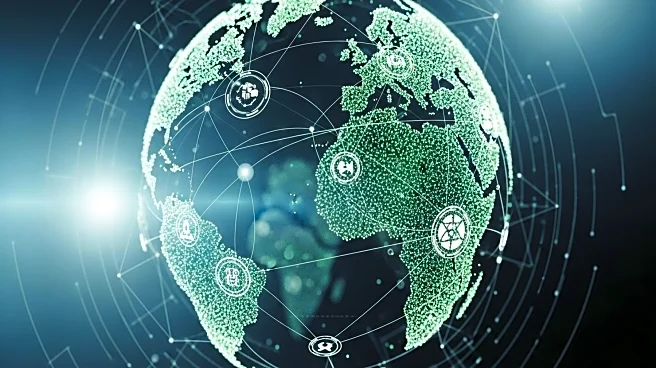What is the story about?
What's Happening?
The World Trade Organization (WTO) has updated its forecast for global trade growth in 2025, predicting a significant increase to 2.4% from the previous estimate of 0.9%. This revision comes amid strong growth in emerging markets and increased demand for artificial intelligence-related goods, such as semiconductors and telecommunications equipment. However, the WTO has also warned of a potential slowdown in 2026, with trade volume growth expected to drop to 0.5%. The organization attributes this anticipated decline to the cooling global economy and the full impact of higher tariffs, which have been a major factor since President Trump implemented a widespread tariff regime. The report highlights that the U.S. accounted for a significant portion of AI-related trade growth, although Asia led the expansion in this sector.
Why It's Important?
The revised forecast for 2025 indicates a robust expansion in global trade, driven by factors such as AI-related spending and favorable macroeconomic conditions. This growth could benefit industries involved in technology and manufacturing, particularly those in emerging markets. However, the predicted slowdown in 2026 poses challenges for global commerce, as higher tariffs and policy uncertainties could impact trade volumes. The U.S. and its allies may face economic pressures due to these trade restrictions, potentially affecting consumer prices and business operations. The focus on AI-related goods underscores the importance of technological advancements in driving trade growth, highlighting opportunities for innovation and investment in this sector.
What's Next?
As the global economy faces potential headwinds in 2026, stakeholders may need to adapt to changing trade dynamics. Businesses might explore new markets or adjust supply chains to mitigate the impact of tariffs. Governments could engage in negotiations to reduce trade barriers and foster economic cooperation. The sustained growth in AI-related goods presents opportunities for continued investment and development in technology sectors, potentially offsetting some of the negative effects of trade restrictions. Monitoring policy changes and economic indicators will be crucial for anticipating future trade trends and making informed decisions.
Beyond the Headlines
The focus on AI-related trade growth highlights the transformative impact of technology on global commerce. As countries compete to develop and export AI products, ethical considerations around data privacy and security may arise. Additionally, the reliance on emerging markets for trade expansion could lead to shifts in geopolitical power dynamics, influencing international relations and economic policies. The interplay between technology and trade underscores the need for comprehensive strategies that address both economic and ethical challenges.
















